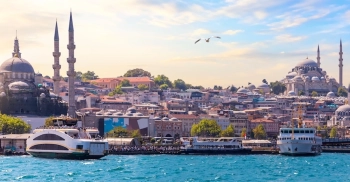Turkey's Tourism Boom: Record $25.8 Billion Revenue in First Half of 2024
What is driving Turkey's tourism sector to unprecedented heights? How did the country achieve a staggering $25.8 billion in tourism revenue in just six months? And why does this matter for the global travel industry? Turkey's latest tourism figures reveal a remarkable recovery and growth trajectory, setting new benchmarks for the sector. This article explores the factors behind this success, the strategies employed, and what it means for travelers and investors alike.
1. Historic Milestone: Turkey's Tourism Revenue Soars
Turkey's tourism industry has shattered records, generating $25.8 billion in revenue during the first half of 2024—a 10.3% increase compared to the same period in 2023. This achievement marks the highest half-year earnings in the country's history, showcasing its resilience and appeal as a top global destination.
The surge was fueled by a 5.1% rise in visitor numbers, with 21.7 million tourists arriving between January and June. Key markets like Germany, Russia, and the UK contributed significantly, while emerging markets in Asia and the Middle East also showed robust growth. For instance, Istanbul's new airport saw a 20% increase in transit passengers, highlighting Turkey's strategic connectivity.
2. Strategic Investments: Infrastructure and Marketing
Turkey's success didn't happen overnight. The government and private sector have made strategic investments in infrastructure, including airports, hotels, and cultural sites. The "Tourism for All Seasons" initiative promoted year-round travel, reducing reliance on summer peaks.
For example, Antalya's smart city upgrades—such as digital tourist guides and eco-friendly resorts—enhanced visitor experiences. Meanwhile, Istanbul's mega-projects, like the Galataport cruise terminal, attracted high-spending travelers. These efforts were complemented by aggressive digital marketing campaigns targeting niche markets, from gastronomy tours to medical tourism.
3. Diversification: Beyond Sun and Sea
Turkey has successfully diversified its tourism offerings, moving beyond traditional beach holidays. Cultural tourism thrived with UNESCO sites like Ephesus and Göbekli Tepe drawing history enthusiasts. Adventure tourism also grew, with Cappadocia's hot-air balloon rides becoming a global icon.
A standout example is the "Turkish Riviera Golf Week," which lured affluent European golfers to Antalya's world-class courses. Similarly, health tourism revenue jumped by 15%, with patients flocking to Istanbul’s state-of-the-art hospitals for affordable, high-quality care.
4. Economic Impact: Jobs and Local Development
The tourism windfall has created a ripple effect across Turkey's economy. Over 1.2 million jobs were added in hospitality, transport, and retail sectors. Coastal towns like Bodrum and Fethiye reported 30% spikes
Small businesses benefited, too. A family-run pottery workshop in Avanos, Cappadocia, saw revenue triple after featuring in a viral travel vlog. Such stories underscore how tourism drives inclusive growth, uplifting communities beyond major cities.
5. Challenges and Sustainability Goals
Despite the boom, Turkey faces challenges like overtourism in hotspots like Hagia Sophia and environmental concerns. The government responded with carrying capacity limits and green certifications for hotels. For instance, Kaş introduced a daily visitor cap to protect its marine ecosystems.
Looking ahead, Turkey aims to balance growth with sustainability. Projects like carbon-neutral resorts in Muğla and solar-powered public transport in tourist zones set a precedent for eco-conscious travel.
6. The Future: Turkey's 2030 Tourism Vision
Turkey's ambitious 2030 Tourism Strategy targets $100 billion in annual revenue by diversifying further into luxury, MICE (Meetings, Incentives, Conferences, Exhibitions), and digital nomad segments. New visa incentives and AI-driven personalized travel plans are in the pipeline.
An early success is the "Workation Turkey" program, attracting remote workers with blended work-leisure packages. As global travel evolves, Turkey is poised to remain a leader by adapting to trends while preserving its unique heritage.






